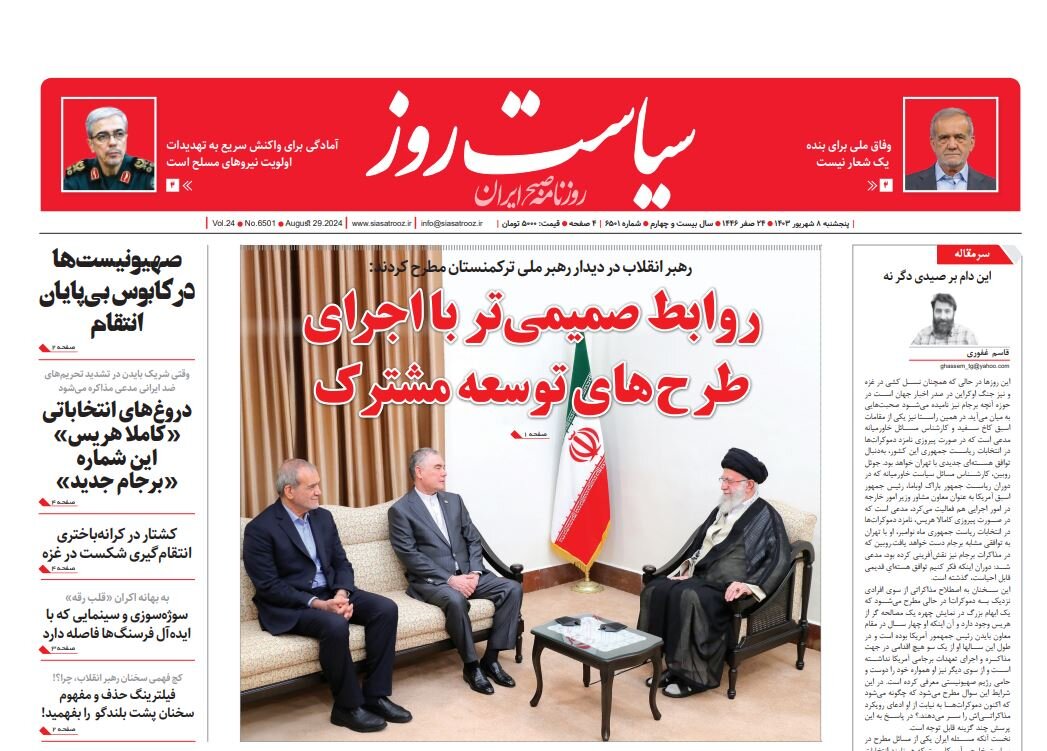TEHRAN PAPERS

TEHRAN - In its editorial, Siasat-e-Rooz pointed out the American claim about the new nuclear agreement with Iran.
It wrote: Joel Rubin, an expert on Middle East politics, claims that if Kamala Harris wins, she will reach an agreement with Tehran similar to the JCPOA. It should be said that Kamala Harris has been the Vice President of the U.S. President for four years, and during these years, she has not taken any steps to negotiate and implement the commitments of the United States, and she has always considered herself a friend and supporter of the Zionist regime. This fact should also be kept in mind that the trick of the Americans has always been that by claiming to write a new agreement instead of revitalizing the previous one, they implement new dimensions of demands and limitations against the other party. If a new agreement is to be made, its focus should be only on the lifting of sanctions, and the verification of this lifting by Iran, as well as the commitment of the West not to repeat the sanctions, and Iran should not bear any new obligations. The game of writing the new JCPOA is the hegemonic game of the United States, in which not getting caught requires relying on inner values ??and ignoring the empty imaginations of the Western side's commitment.
Iran: Iran is on the way to becoming the gas hub of the region
In a note, the Iran newspaper discussed the trip of the national leader of Turkmenistan, Gurbanguly Bardimuhamedow, to Iran and said: The evidence and statements of Pezeshkian and the national leader of Turkmenistan show that the relations between the two neighbors are expanding rapidly, and the most important of them is the gas agreement with Turkmenistan. Pezeshkian called this agreement "a strategic measure to turn Iran into a gas hub of the region". The noteworthy point of the leader of Turkmenistan is that despite the regional and international pressures, he has never agreed to let this country become a base for the rivals of the Islamic Republic of Iran. Therefore, this trip can be interpreted as a turning point in the relations between the two neighbors. Iran has a special view of its neighbors especially during the period of sanctions. Neighbors, including Turkmenistan, depend on their neighbors to overcome geopolitical limitations. This interdependency is the way to overcome the challenges that extra-regional actors impose on the region. At the same time, this interdependency will provide the basis for the expansion of neighborly relations, which, in addition to political proximity, have undeniable historical and cultural commonalities.
Donya-e-Eqtesad: Iran's response to Haniyeh's assassination will be purposeful
In a commentary, Donya-e-Eqtesad dealt with Iran's retaliation. It wrote: After weeks of regional anxiety about a wider war, Hezbollah's limited attack on Israel shows that Iran, like its ally, intends to curb the risk of escalation. However, Iran's response stays ambiguous and Tehran could still choose an action that regional observers do not forecast. But Hezbollah's choice to respond to Israel and implement a limited attack is an option that some experts in the region believe may reflect Iran's plans. Some U.S. officials said Iran was likely to delay any response as long as negotiations to mediate a Gaza ceasefire continued. Some regional experts also pointed to intense diplomatic efforts over the prospect of negotiations to lift sanctions. According to Maha Yahya, the director of the Carnegie Middle East Center in Beirut, Iran is very pragmatic and of course, thinks about how to get points from this work.
Ham Mihan: Shadow of the snapback mechanism
In an article, Ham Mihan addressed the challenge facing the 14th government to manage and reduce tension with Europe and said: Whenever the tension between Tehran and Washington has reached its peak, Europe has not only not shown any desire to develop relations but also has joined to the White House to continue its hostility against Tehran. The new round of tension between Iran and Europe, which has been established since 2022, is a turning point in the history of these relations. Today, the 14th government is at a point in its relations with the three European countries that are members of the JCPOA, where the lack of agreement between Tehran and the European troika means that one or all three of these countries will use the snapback mechanism against the Islamic Republic of Iran before the end of the resolution. As a result, all the sanctions of the Security Council will be returned. Now, the diplomatic system is preparing to start the process of positive interaction with Europe when the United States is ready to hold presidential elections in November, although it will face many challenges along the way.

No comments:
Post a Comment